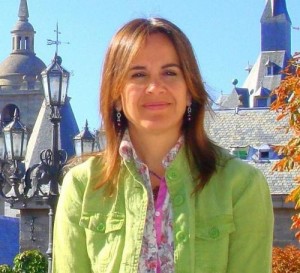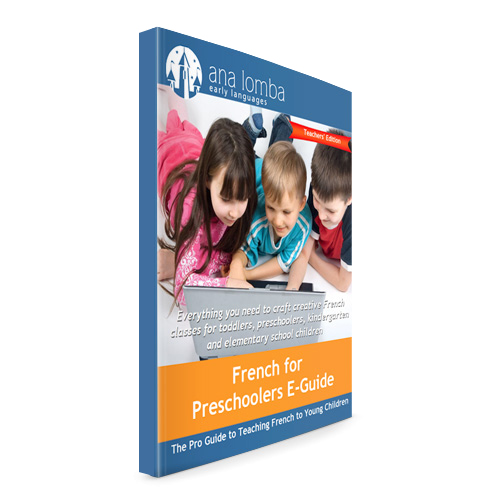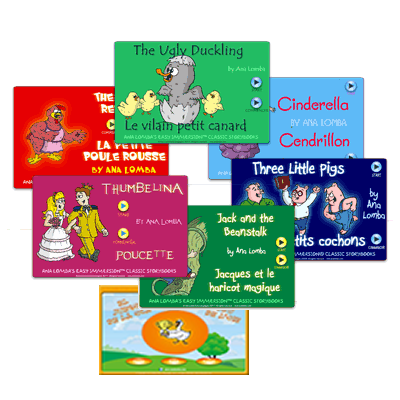Description
Don’t Fear the First Day! Get Everything You Need
to Start Teaching French to Preschoolers Like a Pro…
Even If You Have No Experience!
Bonjour! My name is Ana Lomba, and I have a question for you. Can you relate to this?
You were excited to start teaching French to preschoolers, but now the first day of class is quickly approaching and this sinking feeling in your belly is growing each day. In fact, you are starting to freak out.
What will you do when all those little children are looking at you expecting something new and exciting to do?
Will you be able to hold their attention or will they be running amok in the classroom? Will they have fun?
And what will you teach them day after day? What happens when you run out of colors, numbers, and days of the week?
How can you teach true French immersion when they won’t understand what you are saying?
I remember those fears and doubts very well. Although I had a lot of experience teaching university students, my first attempt at teaching language immersion to young kids was a total failure!
I had spent two months organizing and preparing activities and lesson plans for my students, but the children were, well… bored. And I was too! It was a teacher’s nightmare come true.
When Teaching French Is Done Right, Children Learn It…
Amazingly Fast…
There’s a reason immersion is gaining traction? What do you think that reason is?
Why would a teacher choose to teach with interesting activities in the target language rather than taking a simpler approach like flashcards?
Why would a teacher speak in French a majority of the time when the students don’t understand at first?
Why would parents choose to spend more on a French immersion program vs. a flashcard-based program?
Results.
They do it because, teaching with the correct methods, these French programs are more successful. And so much more fun and amazing for the students and teachers!
Here’s the proof…
“The way that Ana starts with one simple story, building on it to build a vocabulary with each individual character in the story, I just thought that was great. The students love it. They love the teacher. They look forward to her coming. They’ve even asked her questions about how do you say so-and-so, and it’s not even part of the lesson for the day. They are really thoroughly enjoying it.
“I sent home a survey to all of the parents to ask if they would be willing to pay for the program next year. All of them said yes. One hundred percent said yes. Even the ones that didn’t have a child that age, they were definitely for it.”
— Debby Daniel-Bryant, Preschool administrator, who hires other teachers
“Pre-K four is having an absolute ball with this. They are having a tremendous time. They are using the language. It is absolutely incredible. As a matter of fact, the first day, one of the little girls said, ‘Oh I love this. This is so much fun!’ I was blown away
“Being able to have little kids be able to speak the language in sentences and say what they want, I just thought that was fabulous. They can transition from ‘I want cereal’ to ‘I want a crayon’ or something, being able to use the words in different context. The kids are able to speak back and forth to each other. The other curricula I’ve seen, they would just speak to the teacher and not to each other. Now they’re able to say it to each other. That’s awesome.”
— Janet Simpson, Preschool teacher
When taught incorrectly, programs end up with bored students, frustrated teachers, unhappy parents, and lower attendance rates. I personally experienced this myself.
So what was missing? Where did I, a native Spanish speaker and teacher, go wrong?
The question is simply this: did I know how to teach to young children at the time, or was I simply guessing?
To bridge the gap between a great, high-performing teacher and one in 1st gear, you need to stop guessing, like I did…
You need to know what a pro knows without spending 1000s of dollars on books, courses, and other resources.
French for Preschoolers E-Guide Is Designed
for Passionate Teachers and Administrators Like You…
In Part 1 of the E-Guide Alone, You’ll Get
Time-Tested, Proven Answers, Like…
- Why parents need to be your partners and how you get them to be
- How to get more people interested in your program
- What considerations you need to account for
- toddlers
- preschoolers
- kindergartners and early elementary
- note: there is no section here specifically for 8-10 year olds. However, there are activities and other information in later sections for this late elementary group.
- What various teaching approaches there are and which ones work best for a particular age group
- How to incorporate the various teaching approaches in the classroom
- Actual activities for each approach that you can start using in the classroom (This section contains activities for toddlers, preschoolers, kindergartners and early elementary, as well as late elementary)
…And Regarding Curriculum…
- How to create a long-term curriculum plan
- What themes to use
- How to optimize the classroom experience
- Having the ideal class size
- Running the class smoothly
- Making sure all your students are learning
- Knowing when to speak in English and French
- Propelling your student’s skills in French
- Using activities that can achieve higher proficiency
- Teaching culture
- Finding materials and tools to help your students learn in class and at home
- How to measure learning
- How to make your program shine
- Standards and proficiency guidelines
- “Backward Design” Planning
- P21 skills
In the 2nd Part of the E-Guide, You’ll Discover Why
Ana Lomba’s Easy Immersion® System Is Much More than a Language Curriculum for Kids…
- Why you shouldn’t rely too much on flashcards
- Why learning in context with many connections is such a powerful tool
- What Ana Lomba’s Easy Immersion® Is About
- How Ana Lomba’s Easy Immersion® Is Structured
- What Ana’s favorite techniques are (depending on age level)
Appendix 1 Contains a 60-Minute, Bilingual, Preschool Lesson Plan Sample
See How to Combine Everything in the E-Guide to
Get Your Program Moving into High Gear…
- What goals and objectives you should consider
- How to set the stage for the class
- What 14 pre-planned, bilingual activities you can pick and choose from for Day 1
In Appendix 2 It’s Your Turn…
I Show You How to Create Your Own Thematic Unit Using…
My Template…
- Brainstorming
- Deciding on the type of unit
- Thinking about materials and resources to use
- Dividing the unit into daily lesson plans
- Sketching what will take place each day
- Planning the activities for each daily lesson
- Creating a plan to keep in contact and engage the parents
- Writing down the unit
- Organizing and saving everything
- Teaching
You’ll Get Way More Than Just an E-Guide…
My French for Preschoolers Teaching Guide is a complete handbook to my proven methods for teaching French fluency to kids ages 1 to 10. So you will have fun and your students will too!
Based on research on how young children learn best, the E-Guide shows you how to build your own curriculum, engage with students so that they are excited to learn, and work with parents to ensure your program’s success.
When you download French for Preschoolers E-Guide, you’ll get…
- A 124-page Teaching Guide in PDF format, packed with my methodology, advice, ideas and activity examples for how to conduct your class almost entirely in French.
- A sample 60-minute lesson plan from one of my thematic units and a template you can use to start creating your own units.
- Text written in English, with activity samples in English and French — so you can start using the activities right away!
- Information, advice, and activity samples for teaching toddlers, preschoolers, kindergartners, and kids up to age 10. The sample 60-minute lesson plan is written for preschoolers, but you can adapt it for older children, using the information in the guide.
- A 30-day, money-back guarantee. If you are not completely satisfied, we’ll give you your money back.
THAT’S NOT ALL! You’ll receive 2 free additional gifts to help get you started. They’ll come by email over the next few days.
This bundle will save you HOURS of frustration and worry, and HUNDREDS or even THOUSANDS of dollars that you could spend unwisely on materials that won’t work. With this guide, you’ll get a complete philosophy and framework that will help you plan your own lesson plans, and evaluate the effectiveness of any curricula you may decide to purchase in the future.
Of Course, You Want More Than Just My Word on This…
So Check Out What People Are Saying
“I am so glad we found Ana Lomba’s immersion system as it proved to be both a fantastic method and an effective guide towards our objective. I am very grateful to Ana, not only for the excellent units we bought from her, but also her genuine interest in knowing and understanding our doubts and giving us her feedback when needed.”
—- Maria Strickland, founder of a bilingual program
“The students love it. The kids are excited when they see me come into their classroom, and they’re so eager to participate. They remember and they can say things week to week, and they can sing the songs I’ve taught them loud and clear and with good pronunciation. The 3-year olds tend to be kind of quiet, yet they want to come up and act out a part. They love holding the ToonFlips and I think that is helpful to have the puppet to pretend to be.”
—- Karla Alvord, teacher
“The method of storytelling using familiar stories is great. The imagination and creativity theatrics are wonderful to use with children. The use of movement and music with language teaching is so powerful! You’ve once again stirred my creative juices. Thanks for giving time to create and share ideas.”
—- Cathy Fenton, teacher
“Ana Lomba’s pedagogy is sound and inspiring. She clearly has a love for teaching young children and delivers instruction in a most engaging manner. We are thankful to Ana for the inspiration that she shared with the many educators in attendance.”
—- Jean Modig, Vice President and Conference Chair, Foreign Language Educators of New Jersey (FLENJ)
“I had a completely different notion as to what it was going to be like when I started looking. I figured it was going to be teaching a lot of colors, shapes and numbers. Then I looked at Ana’s curriculum and I thought ‘Boy, I’ve got it all wrong!”
—- Debby Daniel-Bryant, preschool administrator
“[Ana] has a lot of expertise in this field so we could take her advice seriously. We started with few classes and now we are growing the number of kids learning this beautiful language. The most rewarding part however is seeing them enjoying the class and learning as fast as they do with only a 40 minute weekly class.”
—- Maria Strickland, founder of a bilingual program
“The feedback I’ve had from parents has all been very positive.”
—- Karla Alvord, teacher
Who is the guide for?
- Teachers, school administrators, homeschooling groups, and entrepreneurs exploring the idea of teaching French to kids 1-10 (or you could use it as a model to teach other languages).
- People who want to learn more about my teaching approach in general.
Who is it not for?
- Parents teaching a child at home, unless you plan to start a homeschool group or your own program (this guide is meant for teaching groups of children).
- Teachers who are not fluent in French (the guide is written in English with the samples in French, but in order to teach immersion style, you will need to be fluent in French).
- People who cannot read English (the guide is written in English).
- Tutors (the guide is meant for group instruction, not one-on-one instruction).
- People who are not willing to teach immersion style. If you are satisfied with teaching flashcard style and having your students just parrot back vocabulary, this guide is NOT for you!
Hit the Ground Running – Guaranteed!
 I happily offer you a 30-day guarantee. If you are not entirely satisfied that the French for Preschoolers Teaching Guide gives you the know-how to start teaching true French fluency, I’ll send you every penny of your money back right away!
I happily offer you a 30-day guarantee. If you are not entirely satisfied that the French for Preschoolers Teaching Guide gives you the know-how to start teaching true French fluency, I’ll send you every penny of your money back right away!
Sincerely,
![]()
Ana Lomba
Ana Lomba Early Languages LLC
 Ana Lomba is a Parents’ Choice award-winning author, a leading language educator, and a tireless advocate of early language learning. Ana has been working with young children since 1999. She has taught preschool, elementary, and college-level language courses and held leadership positions with some of the most influential language organizations in the USA, including ACTFL, FLENJ, and NNELL. She has also presented many early language workshops around the country.
Ana Lomba is a Parents’ Choice award-winning author, a leading language educator, and a tireless advocate of early language learning. Ana has been working with young children since 1999. She has taught preschool, elementary, and college-level language courses and held leadership positions with some of the most influential language organizations in the USA, including ACTFL, FLENJ, and NNELL. She has also presented many early language workshops around the country.
After graduating with a law degree from her native country of Spain, Ana pursued graduate studies in Spanish literature and bilingual education at Binghamton University, Princeton University, and NYU.
She lives near Princeton, NJ with her husband and three children.

